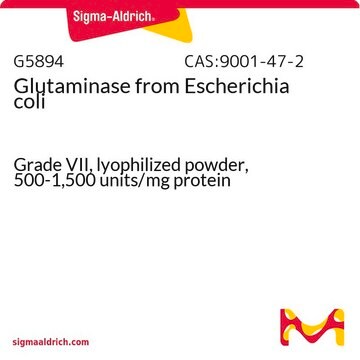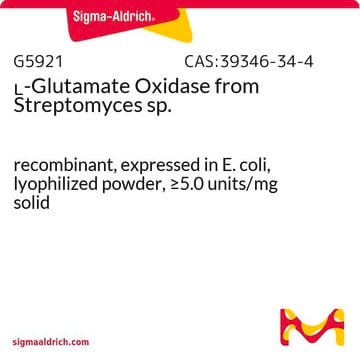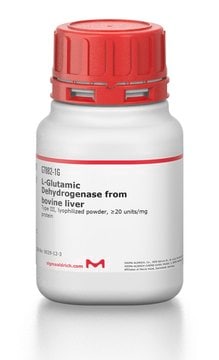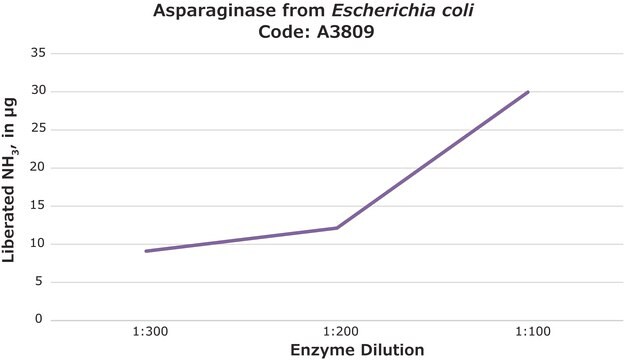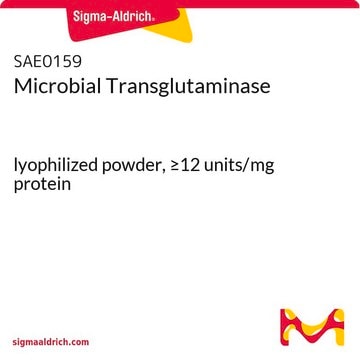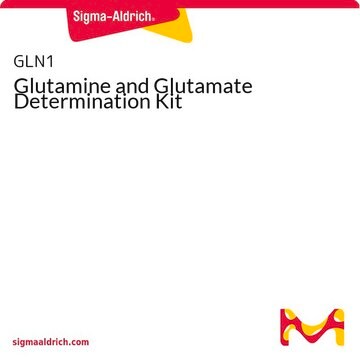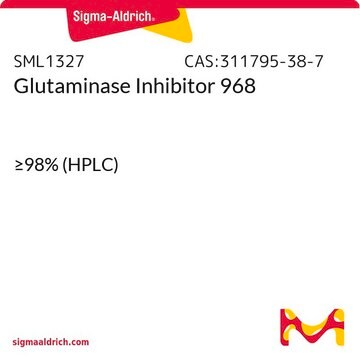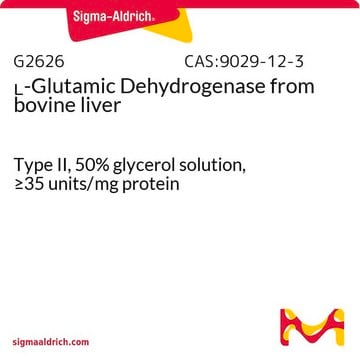G8880
Glutaminase from Escherichia coli
Grade V, lyophilized powder, 50-200 units/mg protein
Synonym(s):
L-Glutamine amidohydrolase
Sign Into View Organizational & Contract Pricing
All Photos(1)
About This Item
CAS Number:
MDL number:
UNSPSC Code:
12352204
NACRES:
NA.54
Recommended Products
biological source
Escherichia coli
Quality Level
type
Grade V
form
lyophilized powder
specific activity
50-200 units/mg protein
mol wt
110 kDa
composition
Protein, ~30% biuret
cation traces
NH4+: <0.1 μg/unit
foreign activity
NADH Oxidase ≤0.01%
storage temp.
−20°C
Looking for similar products? Visit Product Comparison Guide
General description
Glutaminase is an amidohydrolase. It has the catalytic domain in the N-terminal and the C-terminal extension possesses STAS domain.
Application
Glutaminase from E.coli has been used:
- for the determination of glutamine from the cerebral cortex tissue extract
- for immobilization on aminopropylsilylated controlled pore glass (CPG) for determination of glutamine
- in combination with acivicin in in vitro melanoma cells and MCF-7 and OAW-42 cells for cell proliferation and invasiveness assay.
Biochem/physiol Actions
Glutaminase catalyzes the conversion of glutamine to glutamate.
Glutaminase from Escherichia coli along with acivicin, a glutamine analog regulates proliferation and invasiveness of cancer cells. Bacterial glutaminase is implicated in increasing the life span of cancer patients by lowering the tumor burden.
Unit Definition
One unit will deaminate 1.0 μmole of L-glutamine per min at pH 4.9 at 37 °C.
Physical form
Lyophilized powder containing potassium succinate and EDTA
Storage Class Code
11 - Combustible Solids
WGK
WGK 1
Flash Point(F)
Not applicable
Flash Point(C)
Not applicable
Personal Protective Equipment
dust mask type N95 (US), Eyeshields, Gloves
Choose from one of the most recent versions:
Certificates of Analysis (COA)
Lot/Batch Number
Don't see the Right Version?
If you require a particular version, you can look up a specific certificate by the Lot or Batch number.
Already Own This Product?
Find documentation for the products that you have recently purchased in the Document Library.
Customers Also Viewed
Ayşegül Erdem et al.
Nature communications, 13(1), 2013-2013 (2022-04-21)
Metabolic programs can differ substantially across genetically distinct subtypes of acute myeloid leukemia (AML). These programs are not static entities but can change swiftly as a consequence of extracellular changes or in response to pathway-inhibiting drugs. Here, we uncover that
Acivicin with glutaminase regulates proliferation and invasion of human MCF-7 and OAW-42 cells-An in vitro study
Roy S, et al.
Indian Journal of Experimental Biology, 46, 22-26 (2008)
Functional and structural characterization of four glutaminases from Escherichia coli and Bacillus subtilis
Brown G, et al.
Biochemistry, 47(21), 5724-5735 (2008)
Porta-caval shunting changes neuronal sensitivity to ammonia
Raabe W and Onstad G
Journal of the Neurological Sciences, 71(2-3), 307-314 (1985)
Modulation of metastatic potential of B16F10 melanoma cells by acivicin: synergistic action of glutaminase and potentiation of cisplatin cytotoxicity
Roy S and Maity P
Asian Pacific Journal of Cancer Prevention, 8(2), 301-301 (2007)
Our team of scientists has experience in all areas of research including Life Science, Material Science, Chemical Synthesis, Chromatography, Analytical and many others.
Contact Technical Service